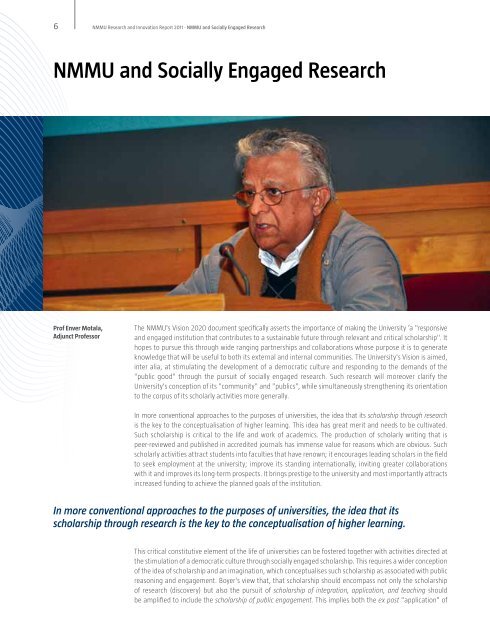2011-NMMU-Research-Report - Research Management - Nelson ...
2011-NMMU-Research-Report - Research Management - Nelson ...
2011-NMMU-Research-Report - Research Management - Nelson ...
Create successful ePaper yourself
Turn your PDF publications into a flip-book with our unique Google optimized e-Paper software.
6 <strong>NMMU</strong> <strong>Research</strong> and Innovation <strong>Report</strong> <strong>2011</strong> - <strong>NMMU</strong> and Socially Engaged <strong>Research</strong><br />
<strong>NMMU</strong> and Socially Engaged <strong>Research</strong><br />
Prof Enver Motala,<br />
Adjunct Professor<br />
The <strong>NMMU</strong>'s Vision 2020 document specifically asserts the importance of making the University ‘a "responsive<br />
and engaged institution that contributes to a sustainable future through relevant and critical scholarship". It<br />
hopes to pursue this through wide ranging partnerships and collaborations whose purpose it is to generate<br />
knowledge that will be useful to both its external and internal communities. The University's Vision is aimed,<br />
inter alia, at stimulating the development of a democratic culture and responding to the demands of the<br />
"public good" through the pursuit of socially engaged research. Such research will moreover clarify the<br />
University's conception of its "community" and "publics", while simultaneously strengthening its orientation<br />
to the corpus of its scholarly activities more generally.<br />
In more conventional approaches to the purposes of universities, the idea that its scholarship through research<br />
is the key to the conceptualisation of higher learning. This idea has great merit and needs to be cultivated.<br />
Such scholarship is critical to the life and work of academics. The production of scholarly writing that is<br />
peer-reviewed and published in accredited journals has immense value for reasons which are obvious. Such<br />
scholarly activities attract students into faculties that have renown; it encourages leading scholars in the field<br />
to seek employment at the university; improve its standing internationally, inviting greater collaborations<br />
with it and improves its long-term prospects. It brings prestige to the university and most importantly attracts<br />
increased funding to achieve the planned goals of the institution.<br />
In more conventional approaches to the purposes of universities, the idea that its<br />
scholarship through research is the key to the conceptualisation of higher learning.<br />
This critical constitutive element of the life of universities can be fostered together with activities directed at<br />
the stimulation of a democratic culture through socially engaged scholarship. This requires a wider conception<br />
of the idea of scholarship and an imagination, which conceptualises such scholarship as associated with public<br />
reasoning and engagement. Boyer's view that, that scholarship should encompass not only the scholarship<br />
of research (discovery) but also the pursuit of scholarship of integration, application, and teaching should<br />
be amplified to include the scholarship of public engagement. This implies both the ex post "application" of


